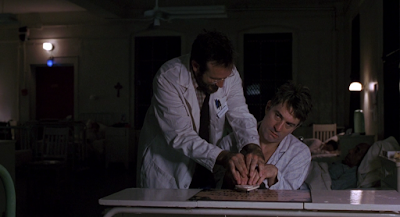1. Traditional Chinese cooking as a way of expressing love
The expression of love is portrayed in different forms in this film, as it deals with lots of relationships between the characters. Mr Chu is portrayed as the stereotypical Asian parent who does not explicitly express his love towards his children in an outwardly affectionate manner, although he does it in other ways. For instance, the Sunday dinner that the family has each week is symbolic to their ritual, even though the daughters do not see it that way. Instead, they feel as if they are being dragged to the dinner every time and feel as if they have other better things to do.
However, Mr Chu chooses this channel to express his love for them - elaborate meals that require a lot of preparation into them. He also does it in other forms, such as doing their laundry, folding their clothes, making sure they wake up before they're late, scolding Jia-Chen for falling asleep on her desk, and of course, cooking for them. The daughters sometimes miss these expressions and they do not pay attention. They've grown up in a generation where Hollywood movies is a norm, and so are instances of verbally saying "I Love You," on their screens that it instilled different expectations for them compared to their father.
In these cooking scenes, it demonstrates just how much goes into food preparation for their Sunday dinners. The meticulous nature of it symbolises the care they take in making each dish. Mr Chu shows that when he expresses his love, he expresses it wholeheartedly.
2. Daughters' personalities according to Freud's theory of personality
Jia-Ning, the youngest sister among the rest. She resembles the Id, one of three in Freud's theory of personality. The Id runs unconsciously and urges one to take part in activities that are considered to be pleasurable (Lapsley & Stey, 2011). In the film, Jia-Ning was the first sister to meet her partner, then unexpectedly got pregnant and had to arrange a shotgun wedding. It was the most impulsive decision and could symbolise the Id.

Jia-Jen, the eldest sister of the Chu family. She was the second sister to get married unexpectedly, albeit not as impulsively as Jia-Ning. As a devout Christian, at least she gave a bit of thought into marrying her partner and the reasons behind it, unlike her younger sister. Jia-Jen represents the Ego in which she often represses her true feelings and functions with self-preservation (Lapsley & Stey, 2011). According to Lapsley and Stey (2011), "the internal drive stimuli attempts to control the demands of the instincts by judiciously deciding the mode of satisfaction, or if satisfaction is to be had at all." This mirrors Jia-Jen in several scenes, such as when she tells Jia-Chen that she will stay with their dad to take care of him, or when she daydreams about Mingdao but refuses to act on her feelings (but she eventually gave in and kissed him anyway). It shows how she holds back, especially due to her religion, but eventually, she can't help but have her emotions make her decisions. It could also be due to the pressure of being the eldest and from people surrounding her to remind about finding a boyfriend, which made her act impulsively in the end.

And Jia-Chen, the middle sister. She is the most responsible and most hardworking; she does things logically and rationally. She resembles the Superego -- it represents the moral sense of a personality, as it generates guilt as a response against the flaws and deficiencies of the ego (Lapsley & Stey, 2011). When she wanted to move out, she felt guilty for wanting to do so. And when she got promoted, she declined the offer to stay in order to take care of her father; she was worried about his health. Even in times of wanting to escape, or receiving great opportunities that can take her forward, she decided to stay and does what is morally right in her eyes.
3. Mr Chu's relationship with Jia-Chien
In the beginning of the film, Jia-Chen decides to buy a new apartment and plans to move out, but she eventually had to stay due to circumstances at that time. The irony of it all is that she was very vocal about wanting to move out at first, but ends up the one who stays after everyone leaves -- even the father leaves, when in fact, she stayed because of him.
As the film goes along, the characters' layers unpeel. We develop a deeper understanding and a certain depth to these characters as they unveil more layers and dimensions of themselves. It becomes more of a transformation on their part to be able to see how they progress throughout the film.
It seemed that Jia-Chen was the closest to her father, despite wanting to get away the most. Her relationship with Mr Chu is built on their passion for cooking, as she used to watch him cook when she was younger. This created somewhat of a special bond that she has with him that her sisters do not have. Moreover, certain scenes in the film show snapshots of their family portrait, and Jia-Chen appears to have an uncanny resemblance to her mother. Perhaps a contribution to their relationship as Mr Chu would be reminded constantly of his late wife.
Reference:
Lapsley, D. K. and Stey, P. C. (2011) Encyclopedia of Human Behaviour. Second edn. Elsevier.









